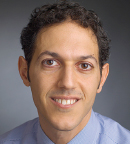A new study by researchers from the National Cancer Institute (NCI) Cancer Genome Analysis Network, a collaborative group with investigators in the United States, Canada and Europe, provides the most comprehensive look to date at the effect of ancestry on the molecular makeup of normal and cancerous tissues. Drawing on data from The Cancer Genome Atlas involving 10,678 patients and 33 cancer types, the investigators found ancestry was tied to variations in hundreds of genes, but the most important of these differences were linked to specific tissue types. The study was published online earlier this month in Cancer Cell.1

Rameen Beroukhim, MD, PhD

Andrew Cherniack, PhD
“We found that in patients of different ancestries, the molecular features corresponding to those differences were largely confined to specific organs and tissue types,” said Rameen Beroukhim, MD, PhD, of Dana-Farber Cancer Institute and the Broad Institute, the co-senior author of the study with Andrew Cherniack, PhD, group leader also of Dana-Farber Cancer Institute and the Broad Institute. “This suggests that tracking the molecular effects of ancestry—both in normal and cancer tissue—needs to take a tissue-by-tissue approach.”
Study Findings
Two key study findings were featured. First, from a molecular standpoint, people of African ancestry tend to have a different type of kidney cancer than people of European ancestry. The African variety is marked less often by mutations that disable the VHL gene, spurring the growth of new blood vessels for tumors. Second,
bladder cancers in people of East Asian extraction show fewer signs of drawing an immune system response than bladder tumors in people of European background.
In the study, investigators used a variety of molecular techniques to determine the ancestry of the patients whose tissue samples were analyzed. Patients were classified as being primarily of European, East Asian, African, Native/Latin American, or South Asian descent. Patients whose ancestry was at least 20% mixed were classified as being of admixed descent. (These patients were subcategorized by their primary ancestry, such as African-Admixed, European-Admixed, etc.) As a group, the patients had 33 cancer types, 13 of which were further divided into subtypes.
Molecular Features of Tissue and Ancestry
The Cancer Genome Atlas had conducted a deep analysis of each patient’s tissue, testing cancerous and normal cells for a range of molecular features. They included mutations, patterns of DNA methylation, messenger RNA, and microRNA. The NCI Cancer Genome Analysis Network investigators used these data to see whether differences in any of these features reflected differences in ancestry.
“We found that ancestry-associated differences spanned all of these features and were present in hundreds of different genes,” Dr. Cherniack stated. “It turned out, though, that the most significant differences—the ones that affect how cells function and interact with the rest of the body—were profoundly tissue-specific.” Although ancestry affected molecular features in most cancer types, these effects were not shared across cancer types. Molecular differences in lung cancers that were traceable to African ancestry, for example, were not found in breast, pancreatic, or other cancers.
The data also enabled investigators to ask whether the ancestry-related features of normal cells carried over into the cancerous versions of those cells—whether the molecular particularities of lung cells in people of European extraction, for example, are also found in the lung cancer cells of such individuals. They found that this was overwhelmingly the case. “Most of the differences in the normal tissues of people with specific ancestries are recapitulated in cancer,” Dr. Beroukhim stated. Moreover, evidence suggests that some of these differences may contribute to the development of certain cancers in people with similar backgrounds.
Researchers have yet to determine whether the molecular differences between ancestries result from environmental factors or genetic factors. However, they did identify genetic differences between ancestries that could explain many of their findings.
“Our findings point to a need for more samples from diverse ancestries to conduct a truly comprehensive ancestry analysis, especially of normal tissues,” Dr. Beroukhim said. “This study represents an important step in that direction.”
Disclosure: Dr. Cherniack received research funding from Bayer. Dr. Beroukhim owns equity in Ampressa Therapeutics and received research funding from Novartis.
Reference
1. Carrot-Zhang J, Chambwe N, Damrauer JS, et al: Comprehensive analysis of genetic ancestry and its molecular correlates in cancer. Cancer Cell 37:639-654, 2020.

